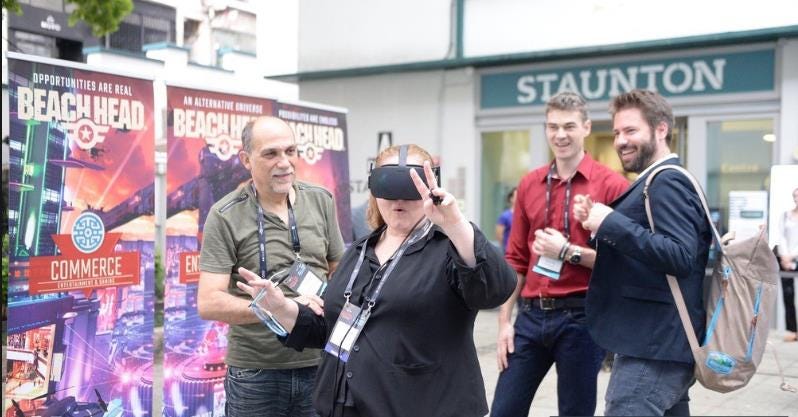Latest news about Bitcoin and all cryptocurrencies. Your daily crypto news habit.
Blockchain and VR Can Be a Match Made in Digital Heaven
Considering that virtual reality (VR) technology offers some fascinating possibilities, it has struggled to gain traction over recent years. TechCrunch reported that in the two years leading up to 2017, VR headset makers Oculus and HTC had likely sold only around half a million headsets between them.
After Facebook acquired Oculus in 2014 for a reported $3bn in 2014, critics in the finance community have noted that the deal is yet to pay off. Mark Zuckerberg himself urged investors to stay patient, stating that VR is locked in a vicious circle of needing enough content to lure in consumers. Of course, developers want to know there is enough of a demand for headsets before investing in such content.
Analysts of the VR markets remain bullish regardless, forecasting sales of hardware and software will more than quadruple over the next few years, from $3.3 billion in 2018 to $14.5 billion in 2021.
 Image Source: depositphotos.comConverging VR and Blockchain
Image Source: depositphotos.comConverging VR and Blockchain
Now, perhaps investors in Facebook and other VR companies will consider it good news that projects are emerging that converge VR with blockchain technology. So far, Decentraland (MANA) has been one of the more successful.
Decentraland is built on Ethereum and allows users to participate in a virtual universe. Exploiting the immutability of blockchain, users of Decentraland can purchase a plot of virtual land with MANA tokens and then build on it as they wish. They can open a business selling other kinds of digital assets, for example, clothing for avatars, and charge for their goods or services in digital currency. Imagine a kind of Second Life program but on the blockchain.
The creators of Second Life are also creating a similar project, called High Fidelity, developed on the EOS blockchain. Although Second Life had its own currency, blockchain offers the opportunity for users to actually own their assets in a VR universe. The project raised $70 million in funding to develop the VR platform, which is based on a stable coin.
Other projects have sought to converge VR and blockchain to varying degrees of success. For example, CEEK (CEEK) is an established VR headset manufacturer focused on entertainment content, partnering with names such as Lady Gaga and Megadeth. Last year, the company held an ICO for its CEEK token, with a view to developing a VR entertainment universe where users can buy tickets to virtual events.
A similar project to this is VibeHub (VIBE), which allows anyone to buy or sell VR experiences using the VIBE token. Think educational tutorials in a musical instrument or foreign language, or seeing a stand-up comedy show.
Bringing Gaming into the Mix
Looking out over the broader blockchain universe, gaming is proving to be one of the most popular and enduring forms of distributed application on platforms like Ethereum or EOS. The top-ranked dapps on sites such as State of the Dapps or Dapp Radar consistently feature games like EOS Knights and My Crypto Heroes. Blockchains capability to offer secure, immutable ownership of in-game assets is an enticing lure for gamers.
Now, BeachHead 2020 is looking to bring a fresh take to an existing game format, using blockchain and VR. Similar to Decentraland, BeachHead is a virtual universe where users can buy and sell land, goods and services using BHT, the native token of the platform. They can also enjoy various entertainment options, such as sports games, concerts or shows.
However, unlike the other projects mentioned here, BeachHead offers the incentive of in-game objectives — a critical engagement tactic for gaming enthusiasts. The premise is that the virtual city is under siege, and the residents will participate in the game by defending the city from invaders. In doing so, they can also earn digital currency for spending in the BeachHead universe.
Interestingly, BeachHead is constructed on a dual-blockchain layer, using both Ethereum and Ripple. This allows the developers to take advantage of the benefits of both platforms. So, a non-fungible asset can be issued using the ERC-721 standard while the Ripple engine serves as a virtually real-time matching engine, connecting those with assets to offer with those who have currency or other assets to trade.
 Pepe Moreno, BeachHead’s Founder and chief visionary officer is showcasing a demo of the BeachHead city for visitors at Block O2O in HongKongThink You’ve Heard This Name Before?
Pepe Moreno, BeachHead’s Founder and chief visionary officer is showcasing a demo of the BeachHead city for visitors at Block O2O in HongKongThink You’ve Heard This Name Before?
For long-time gaming enthusiasts, BeachHead will be a familiar name. The original BeachHead game was released back in 1999 as an arcade shooter. The object was to amass enough ammo to progress through the levels, using weaponry including anti-aircraft and anti-tank guns to defend against an onslaught of land and air attacks.
Both the original game and the new 2020 version were conceived by Pepe Moreno. Moreno has over 30 years of experience in traditional and digital art forms and entertainment media. He also created Digital Justice, the world’s first ever digital graphic novel. On the technical development side, the BeachHead team has Alexis Sirkia, formerly of the European Space Center, and Dave Taylor, one of the original game programmers of Doom and Quake.
Given that the predominant user base of VR to date has been the gamer community, it’s perhaps unsurprising that blockchain projects are now emerging that combine gaming and VR. Some may be more surprised that it’s taken this long for such a project to materialize.
However, the scale of developing an entire virtual universe shouldn’t be underestimated. If these projects take off, the analyst’s bullish sentiments about the potential of the VR market may even end up being more conservative than anyone could have predicted.
Why Blockchain and VR Might Be a Match Made in Digital Heaven was originally published in Hacker Noon on Medium, where people are continuing the conversation by highlighting and responding to this story.
Disclaimer
The views and opinions expressed in this article are solely those of the authors and do not reflect the views of Bitcoin Insider. Every investment and trading move involves risk - this is especially true for cryptocurrencies given their volatility. We strongly advise our readers to conduct their own research when making a decision.